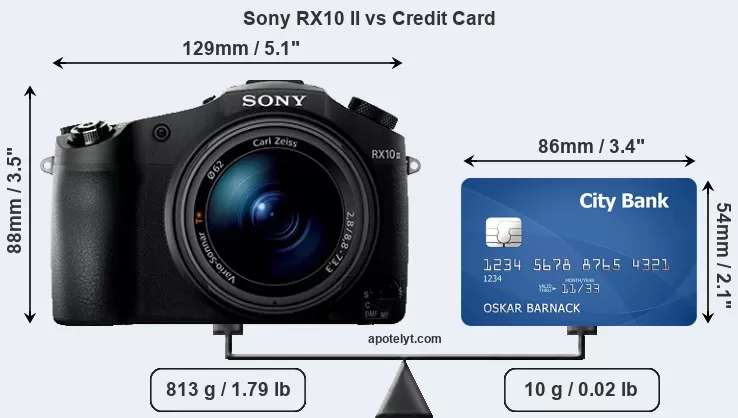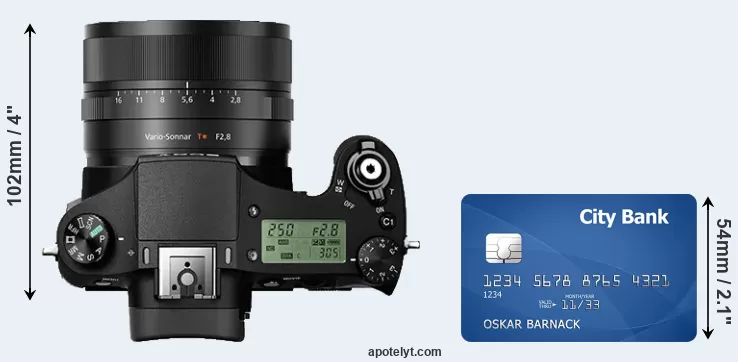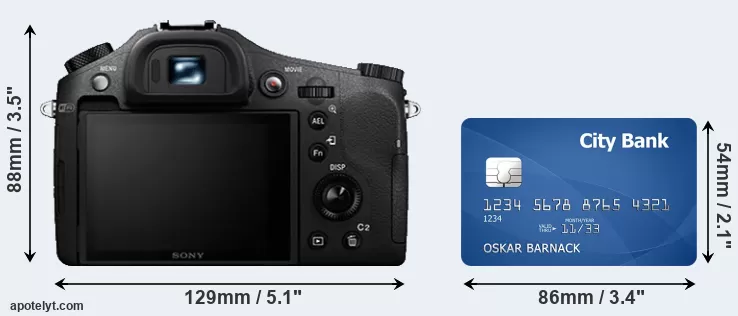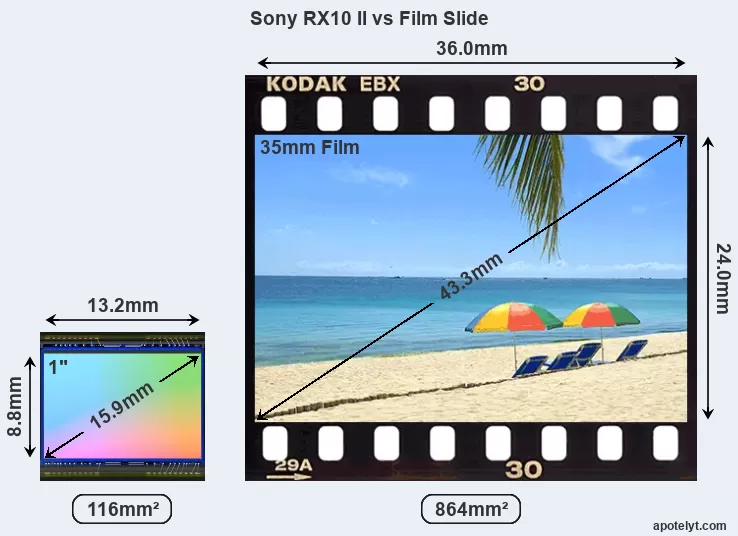Sony RX10 II Comparison Review
The Sony Cyber-shot DSC-RX10 II is a fixed lens compact camera that was officially introduced in June 2015 and is equipped with an one-inch sensor. It offers a resolution of 20 megapixel.

Is the Sony RX10 II a good camera? The RX10 II has a Camera Elo of 2204. This rating puts the RX10 II among the top 30 percent of all travel zoom compact cameras. In terms of its sensor size category (one inch cameras), the RX10 II ranks below average. Based on its within category standings, the camera earns a 3.5-star performance rating.
| Sony RX10 II |
|---|
| Fixed lens compact camera |
| 24-200mm f/2.8 |
| 20 MP, 1" Sensor |
| 4K/30p Video |
| ISO 100 - 12 800 (64 - 25 600) |
| Electronic viewfinder (2359k dots) |
| 3.0 LCD, 1229k dots |
| Tilting screen (no touchscreen) |
| 14 shutter flaps per second |
| Weathersealed body |
| 400 shots per battery charge |
| 129 x 88 x 102 mm, 813 g |
Read on to find out more about the camera's size, sensor, features, reception by expert reviewers, and how it compares to other digital cameras.
Body comparison with a credit card
The physical dimensions of the Sony RX10 II relative to a credit card are illustrated in the side-by-side display below. Three successive views from the front, the top, and the rear are shown. All size dimensions are rounded to the nearest millimeter.



The table below summarizes the key physical specs of the Sony RX10 II alongside a set of similar cameras. If you want to review a particular camera pair side-by-side, just move across to the CAM-parator tool and choose from the broad selection of possible comparisons there.

| Camera Model |
Camera Width |
Camera Height |
Camera Depth |
Camera Weight |
Battery Life |
Weather Sealing |
Camera Launch |
Launch Price (USD) |
Street Price |
||
|---|---|---|---|---|---|---|---|---|---|---|---|
| 1. | Sony RX10 II | 129 mm | 88 mm | 102 mm | 813 g | 400 | Y | Jun 2015 | 1,299 | ebay.com | |
| 2. | Canon 80D | 139 mm | 105 mm | 79 mm | 730 g | 960 | Y | Feb 2016 | 1,199 | ebay.com | |
| 3. | Canon G3 X | 123 mm | 77 mm | 105 mm | 733 g | 300 | Y | Jun 2015 | 999 | ebay.com | |
| 4. | Leica V-LUX Typ 114 | 137 mm | 99 mm | 131 mm | 830 g | 360 | n | Sep 2014 | 1,349 | ebay.com | |
| 5. | Panasonic FZ1000 | 137 mm | 99 mm | 131 mm | 831 g | 360 | n | Jun 2014 | 899 | ebay.com | |
| 6. | Panasonic FZ2500 | 138 mm | 102 mm | 135 mm | 915 g | 350 | n | Sep 2016 | 1,199 | amazon.com | |
| 7. | Sony RX10 | 129 mm | 88 mm | 102 mm | 813 g | 420 | Y | Oct 2013 | 1,299 | ebay.com | |
| 8. | Sony RX10 III | 133 mm | 94 mm | 127 mm | 1051 g | 420 | Y | Mar 2016 | 1,499 | ebay.com | |
| 9. | Sony RX100 III | 102 mm | 58 mm | 41 mm | 290 g | 320 | n | May 2014 | 799 | ebay.com | |
| 10. | Sony RX100 IV | 102 mm | 58 mm | 41 mm | 298 g | 280 | n | Jun 2015 | 999 | ebay.com | |
| 11. | Sony RX100 V | 102 mm | 58 mm | 41 mm | 299 g | 220 | n | Oct 2016 | 999 | ebay.com | |
| Note: Measurements and pricing do not include easily detachable parts, such as add-on or interchangeable lenses or optional viewfinders. | |||||||||||
The listed prices provide an indication of the market segment that the manufacturer of the cameras have been targeting. The Sony RX10 II was launched in the US market at a price of $1,299. Usually, retail prices stay at first close to the launch price, but after several months, discounts become available. Later in the product cycle and, in particular, when the replacement model is about to appear, further discounting and stock clearance sales often push the camera price considerably down. Then, after the new model is out, very good deals can frequently be found on the pre-owned market.

Check RX10 II offers at
ebay.com
Sensor comparison with a 35mm slide
The size of the sensor inside a digital camera is one of the key determinants of image quality. A large sensor will tend to have larger individual pixels that provide better low-light sensitivity, wider dynamic range, and richer color-depth than smaller pixel-units in a sensor of the same technological generation. Furthermore, a large sensor camera will give the photographer more possibilities to use shallow depth-of-field in order to isolate a subject from the background. On the downside, larger sensors tend to be associated with larger, more expensive camera bodies and lenses.
The Sony RX10 II features an one-inch sensor and has a format factor (sometimes also referred to as "crop factor") of 2.7. Within the spectrum of camera sensors, this places the Sony RX10 II among the medium-sized sensor cameras that aim to strike a balance between image quality and portability.

Consistent information on actual sensor performance is available from DXO Mark for most cameras. This service is based on lab testing and assigns an overall score to each camera sensor, as well as ratings for dynamic range ("DXO Landscape"), color depth ("DXO Portrait"), and low-light sensitivity ("DXO Sports"). The table below summarizes the physical sensor characteristics and sensor quality findings and compares them across a set of similar cameras.

| Camera Model |
Sensor Class |
Resolution (MP) |
Horiz. Pixels |
Vert. Pixels |
Video Format |
DXO Portrait |
DXO Landscape |
DXO Sports |
DXO Overall |
||
|---|---|---|---|---|---|---|---|---|---|---|---|
| 1. | Sony RX10 II | 1-inch | 20.0 | 5472 | 3648 | 4K/30p | 23.0 | 12.6 | 531 | 70 | |
| 2. | Canon 80D | APS-C | 24.0 | 6000 | 4000 | 1080/60p | 23.6 | 13.2 | 1135 | 79 | |
| 3. | Canon G3 X | 1-inch | 20.0 | 5472 | 3648 | 1080/60p | 21.4 | 12.3 | 521 | 63 | |
| 4. | Leica V-LUX Typ 114 | 1-inch | 20.0 | 5472 | 3648 | 4K/30p | 21.6 | 11.7 | 127 | 60 | |
| 5. | Panasonic FZ1000 | 1-inch | 20.0 | 5472 | 3648 | 4K/30p | 22.1 | 11.7 | 517 | 64 | |
| 6. | Panasonic FZ2500 | 1-inch | 20.0 | 5472 | 3648 | 4K/30p | 23.0 | 12.6 | 538 | 70 | |
| 7. | Sony RX10 | 1-inch | 20.0 | 5472 | 3648 | 1080/60p | 22.9 | 12.6 | 474 | 69 | |
| 8. | Sony RX10 III | 1-inch | 20.0 | 5472 | 3648 | 4K/30p | 23.1 | 12.6 | 472 | 70 | |
| 9. | Sony RX100 III | 1-inch | 20.0 | 5472 | 3648 | 1080/60p | 22.4 | 12.3 | 495 | 67 | |
| 10. | Sony RX100 IV | 1-inch | 20.0 | 5472 | 3648 | 4K/30p | 22.8 | 12.6 | 591 | 70 | |
| 11. | Sony RX100 V | 1-inch | 20.0 | 5472 | 3648 | 4K/30p | 22.8 | 12.4 | 586 | 70 | |
| Note: DXO values in italics represent estimates based on sensor size and age. | |||||||||||
Many modern cameras are not only capable of taking still images, but also of capturing video footage. The RX10 II indeed provides movie recording capabilities. The highest resolution format that the RX10 II can use is 4K/30p.
Feature comparison
Beyond body and sensor, cameras can and do differ across a range of features. For example, the RX10 II has an electronic viewfinder with a resolution of 2359k dots. The viewfinder offers a field of view of 100% and a magnification of 0.70x. The following tables report on some other key feature differences and similarities of the Sony RX10 II and comparable cameras.

| Camera Model |
Viewfinder (Type or 000 dots) |
Control Panel (yes/no) |
LCD Specifications (inch/000 dots) |
LCD Attach- ment |
Touch Screen (yes/no) |
Max Shutter Speed * |
Max Shutter Flaps * |
Built-in Flash (yes/no) |
Built-in Image Stab |
||
|---|---|---|---|---|---|---|---|---|---|---|---|
| 1. | Sony RX10 II | 2359 | Y | 3.0 / 1229 | tilting | n | 1/3200s | 14.0/s | Y | Y | |
| 2. | Canon 80D | optical | Y | 3.0 / 1040 | swivel | Y | 1/8000s | 7.0/s | Y | n | |
| 3. | Canon G3 X | optional | n | 3.2 / 1620 | tilting | Y | 1/2000s | 5.9/s | Y | Y | |
| 4. | Leica V-LUX Typ 114 | 2359 | n | 3.0 / 921 | swivel | n | 1/4000s | 12.0/s | Y | Y | |
| 5. | Panasonic FZ1000 | 2359 | n | 3.0 / 921 | swivel | n | 1/4000s | 12.0/s | Y | Y | |
| 6. | Panasonic FZ2500 | 2360 | n | 3.0 / 1040 | swivel | Y | 1/4000s | 12.0/s | Y | Y | |
| 7. | Sony RX10 | 1440 | Y | 3.0 / 1229 | tilting | n | 1/3200s | 10.0/s | Y | Y | |
| 8. | Sony RX10 III | 2359 | Y | 3.0 / 1229 | tilting | n | 1/2000s | 14.0/s | Y | Y | |
| 9. | Sony RX100 III | 1440 | n | 3.0 / 1229 | tilting | n | 1/2000s | 10.0/s | Y | Y | |
| 10. | Sony RX100 IV | 2359 | n | 3.0 / 1228 | tilting | n | 1/2000s | 16.0/s | Y | Y | |
| 11. | Sony RX100 V | 2359 | n | 3.0 / 1229 | tilting | n | 1/2000s | 24.0/s | Y | Y | |
| Note: *) Information refers to the mechanical shutter, unless the camera only has an electronic one. | |||||||||||
The LCD screen on the Sony Cyber-shot DSC-RX10 II is flexibly attached to the body. In particular, the LCD can be tilted vertically to facilitate odd-angle shots in landscape orientation. This tilting design is often preferred, for example, by street photographers to a fully articulated, swivel type of LCD attachment, as it is more unobtrusive during shooting than a screen that flips out to the side.

One convenient feature of the RX10 II is the presence of an on-board flash. While this built-in flash is not very powerful, it can at times be useful as a fill-in light to brighten deep shadow areas.
Connection comparison
For some imaging applications, the extent to which a camera can communicate with its environment can be an important aspect in the camera decision process. The table below provides an overview of the connectivity of the Sony Cyber-shot DSC-RX10 II and, in particular, the interfaces the cameras (and selected comparators) provide for accessory control and data transfer.

| Camera Model |
Hotshoe Port |
Internal Mic / Speaker |
Microphone Port |
Headphone Port |
HDMI Port |
USB Port |
WiFi Support |
NFC Support |
Bluetooth Support |
||
|---|---|---|---|---|---|---|---|---|---|---|---|
| 1. | Sony RX10 II | Y | stereo / mono | Y | Y | micro | 2.0 | Y | Y | - | |
| 2. | Canon 80D | Y | stereo / mono | Y | Y | mini | 2.0 | Y | Y | - | |
| 3. | Canon G3 X | Y | stereo / mono | Y | Y | mini | 2.0 | Y | Y | - | |
| 4. | Leica V-LUX Typ 114 | Y | stereo / mono | Y | - | micro | 2.0 | Y | Y | - | |
| 5. | Panasonic FZ1000 | Y | stereo / mono | Y | - | micro | 2.0 | Y | Y | - | |
| 6. | Panasonic FZ2500 | Y | stereo / mono | Y | Y | micro | 2.0 | Y | - | - | |
| 7. | Sony RX10 | Y | stereo / mono | Y | Y | micro | 2.0 | Y | Y | - | |
| 8. | Sony RX10 III | Y | stereo / mono | Y | Y | micro | 2.0 | Y | Y | - | |
| 9. | Sony RX100 III | - | stereo / mono | - | - | micro | 2.0 | Y | Y | - | |
| 10. | Sony RX100 IV | - | stereo / mono | - | - | micro | 2.0 | Y | Y | - | |
| 11. | Sony RX100 V | - | stereo / mono | - | - | micro | 2.0 | Y | Y | - |
It is notable that the RX10 II has a microphone port. Such an external microphone input can help to substantially improve the quality of audio recordings when a good external microphone is used.
The RX10 II has a zoom lens built in (8.8-73.3mm f/2.8-2.8), which, in full frame equivalent terms, provides a focal length range from 24 to 200mm. The camera is, hence, ready to shoot, while remaining more compact in size than an interchangeable lens camera with an optic that offers similar focal length and aperture specifications.
Further information on the features and operation of the RX10 II can be found in the free online Sony RX10 II Manual or on the Sony support site.
Expert reviews
While the specs-based evaluation of cameras is instructive in revealing their potential as photographic tools, it remains partial and cannot reveal, for example, the handling experience and imaging performance when actually working with the RX10 II. User reviews that are available, for instance, at amazon can sometimes shed light on these issues, but such feedback is all too often partial, inconsistent, and inaccurate. This is why expert reviews are important. The table below summarizes the assessments of some of the best known camera review sites (amateurphotographer [AP], cameralabs [CL], digitalcameraworld [DCW], dpreview [DPR], ephotozine [EPZ], photographyblog [PB]).

| Camera Model |
AP score |
CL score |
DCW score |
DPR score |
EPZ score |
PB score |
Camera Launch |
Launch Price (USD) |
Street Price |
||
|---|---|---|---|---|---|---|---|---|---|---|---|
| 1. | Sony RX10 II | 5/5 | + + | .. | 82/100 | 4.5/5 | 4/5 | Jun 2015 | 1,299 | ebay.com | |
| 2. | Canon 80D | 4/5 | + + | 4.5/5 | 84/100 | 4.5/5 | 4.5/5 | Feb 2016 | 1,199 | ebay.com | |
| 3. | Canon G3 X | 3.5/5 | + | .. | .. | 4.5/5 | 4/5 | Jun 2015 | 999 | ebay.com | |
| 4. | Leica V-LUX Typ 114 | .. | .. | .. | .. | .. | 5/5 | Sep 2014 | 1,349 | ebay.com | |
| 5. | Panasonic FZ1000 | 4/5 | + + | .. | 82/100 | 4.5/5 | 4.5/5 | Jun 2014 | 899 | ebay.com | |
| 6. | Panasonic FZ2500 | .. | + | .. | 82/100 | 4.5/5 | 5/5 | Sep 2016 | 1,199 | amazon.com | |
| 7. | Sony RX10 | 5/5 | + | .. | 80/100 | 4.5/5 | 4.5/5 | Oct 2013 | 1,299 | ebay.com | |
| 8. | Sony RX10 III | 5/5 | + | .. | 84/100 | 4.5/5 | 4.5/5 | Mar 2016 | 1,499 | ebay.com | |
| 9. | Sony RX100 III | 5/5 | + + | .. | 82/100 | 4.5/5 | 5/5 | May 2014 | 799 | ebay.com | |
| 10. | Sony RX100 IV | 4.5/5 | + + | .. | 85/100 | 4/5 | 4.5/5 | Jun 2015 | 999 | ebay.com | |
| 11. | Sony RX100 V | 4.5/5 | + + | .. | 83/100 | 4/5 | 4.5/5 | Oct 2016 | 999 | ebay.com | |
| Note: (+ +) highly recommended; (+) recommended; (o) reviewed; (..) not available. | |||||||||||
The review scores listed above should be treated with care, though. The assessments were made in relation to similar cameras of the same technological generation. Hence, a score should always be seen in the context of the camera's market launch date and its price, and comparing ratings of very distinct cameras or ones that are far apart in terms of their release date have little meaning. Also, please note that some of the review sites have changed their methodology and reporting over time.

Check RX10 II offers at
ebay.com
Sony RX10 II FAQ
Below are some additional questions and answers concerning some particular features of the RX10 II.
What type of imaging sensor is used in the Sony RX10 II?
The camera has a BSI-CMOS (Backside Illuminated Complementary Metal–Oxide–Semiconductor) sensor at its core.
Which image processing chip is used in the Sony RX10 II to convert the raw signal into an image file and perform noise reduction and image sharpening?
Sony equipped the RX10 II with the BIONZ X image processor.
What is the ISO sensitivity range of the Sony RX10 II?
The camera has a native sensitivity range from ISO 100 to ISO 12800, which can be extended to ISO 64-25600.
Is completely silent shooting possible with the Sony RX10 II?
The camera has an electronic shutter option, so that it is indeed feasible to capture images without any shutter noise.
Is it difficult to use manual focus lenses with the Sony RX10 II?
The RX10 II offers focus peaking as a manual focus aid. This feature works by placing a colored highlight on in-focus zones within the image.
Does the Sony RX10 II feature an autofocus assist light?
Yes, the camera has a lamp built-in that can illuminate the subject and improve autofocus in low-light settings.
Does the Sony RX10 II support the Ultra High Speed (UHS) bus interface for SD cards?
Yes, the camera can indeed use UHS-I cards (data transfer speed of up to 104 MB/s).
Which battery does the Sony RX10 II use?
The camera gets its power from the Sony NP-FW50 (here at amazon), which is a rechargeable Lithium-Ion power pack.
Camera to camera comparisons
If you would like to see a side-by-side review with another camera, just make a corresponding selection in the search boxes below. An an alternative, you can also directly jump to any one of the listed comparisons that were previously generated by the CAM-parator tool.
- Canon 30D vs Sony RX10 II
- Canon G1 X Mark II vs Sony RX10 II
- Canon G16 vs Sony RX10 II
- Canon XT vs Sony RX10 II
- Fujifilm X-H1 vs Sony RX10 II
- Nikon D5 vs Sony RX10 II
- Olympus E-P3 vs Sony RX10 II
- Olympus E-PL5 vs Sony RX10 II
- Olympus E-PM1 vs Sony RX10 II
- Panasonic TZ95 vs Sony RX10 II
- Panasonic ZS200 vs Sony RX10 II
- Sony A7R vs Sony RX10 II
| Camera Model | Sony RX10 II | |
|---|---|---|
| Camera Type | Fixed lens compact camera | |
| Camera Lens | 24-200mm f/2.8 | |
| Launch Date | June 2015 | |
| Launch Price | USD 1 299 | |
| Sensor Specs | ||
| Sensor Technology | BSI-CMOS | |
| Sensor Format | 1" Sensor | |
| Sensor Size | 13.2 x 8.8 mm | |
| Sensor Area | 116 mm2 | |
| Sensor Diagonal | 15.9 mm | |
| Crop Factor | 2.7x | |
| Sensor Resolution | 20 Megapixels | |
| Image Resolution | 5 472 x 3 648 pixels | |
| Pixel Pitch | 2.41 μm | |
| Pixel Density | 17.18 MP/cm2 | |
| Moiré control | Anti-Alias filter | |
| Movie Capability | 4K/30p Video | |
| ISO Setting | 100 - 12 800 ISO | |
| ISO Boost | 64 - 25 600 ISO | |
| Image Processor | BIONZ X | |
| DXO Sensor Quality (score) | 70 | |
| DXO Color Depth (bits) | 23.0 | |
| DXO Dynamic Range (EV) | 12.6 | |
| DXO Low Light (ISO) | 531 | |
| Screen Specs | ||
| Viewfinder Type | Electronic viewfinder | |
| Viewfinder Field of View | 100% | |
| Viewfinder Magnification | 0.70x | |
| Viewfinder Resolution | 2359k dots | |
| Top-Level Screen | Control Panel | |
| LCD Framing | Live View | |
| LCD Size | 3.0 inch | |
| LCD Resolution | 1229k dots | |
| LCD Attachment | Tilting screen | |
| V-logging Friendliness | No front-flip | |
| Touch Input | No touchscreen | |
| Shooting Specs | ||
| Focus System | Contrast-detect AF | |
| Manual Focusing Aid | Focus Peaking | |
| Maximum Shutter Speed | 1/3200s | |
| Continuous Shooting | 14 shutter flaps/s | |
| Silent Shooting | Electronic Shutter | |
| Time Lapse Photography | no Intervalometer | |
| Fill Flash | Built-in Flash | |
| Storage Medium | MS or SDXC cards | |
| Single or Dual Card Slots | Single card slot | |
| UHS card support | UHS-I | |
| Connectivity Specs | ||
| External Flash | Hotshoe | |
| USB Connector | USB 2.0 | |
| HDMI Port | micro HDMI | |
| Microphone Port | External MIC port | |
| Headphone Socket | Headphone port | |
| Wifi Support | Wifi built-in | |
| Near-Field Communication | NFC built-in | |
| Body Specs | ||
| Environmental Sealing | Weathersealed body | |
| Battery Type | Sony NP-FW50 power pack | |
| Battery Life (CIPA) | 400 shots per charge | |
| In-Camera Charging | USB charging | |
| Body Dimensions |
129 x 88 x 102 mm (5.1 x 3.5 x 4.0 in) |
|
| Camera Weight | 813 g (28.7 oz) | |
Did you notice an error on this page? If so, please get in touch, so that we can correct the information.
You are here: Home » CAM-parator » Sony RX10 II Review
